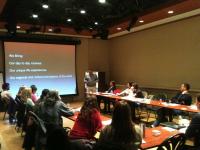On May 31, 2013, the IPinCH Cultural Tourism Working Group hosted a Cultural Tourism Workshop as a kickoff event to the Stó:lo People of the River Conference in Chilliwack, B.C.
Cultural Tourism Working Group Co-Chair, Dave Schaepe and Project Ethnographer, Alexis Bunten, planned the workshop with assistance from Francine Douglas of the Stó:lo Nation Stó:lo Resource Centre. Four Stó:lo communities involved in tourism initiatives were represented at the workshop, including Stó:lo Nation, Chehalis First Nation, Leqamel First Nation and Seabird Island. Other participants included municiple and regional tourism representatives, as well as IPinCH affiliates.
After a roundtable introduction, Alexis Bunten shared a series of examples of different types of cultural tourism adopted by Indigenous communities worldwide, along with discussion of the opportunities and challenges posed by different business models. Guest speaker, Mark McKernan of “Alaska Native Voices,” a consulting service for communities seeking to develop cultural tourism ventures, presented best practices from Huna Totem Corporation’s Icy Straight Point and heritage guide partnerships with Alaska’s Glacier Bay National Park.
For the afternoon session, Bunten facilitated a guided discussion among participants to identify which parts of Stó:lo intellectual property can and should be made available to the public. Questions included: What aspects of culture do Stó:lo want to offer as a tourism experience? What remains off limits and why? What resources need to be in place before developing a tourism program? McKernan gave the final presentation, focused on sharing best practices for interpreting cultural information to visitors, with examples drawn from Icy Straight Point/Glacier Bay Cultural Programming.
Participants filled out a needs assessment and program evaluation questionnaire that has been aggregated to determine ‘next steps’ for capacity-building as the Stó:lo Nation develops its tourism plan and related opportunities.
The evaluation indicated that participants found great value in the event with a unanimous response of “YES” to the question, “would you recommend this workshop?” Out of those who ranked the workshop of a scale of 1-5, the majority circled ‘5,’ with the rest marking ‘4’. When asked to describe the three most useful parts of the workshop, participants listed learning about: 1) cultural tourism models; 2) practical examples of cultural tourism (initial overview, overall global picture, the danger zones, best practices); and 3) heritage and cultural resources (learning from each other, ensuring respect of the Elders and traditional knowledge, the cultural teachings from each other, and frameworks to protect intellectual property. Portions of the event were video recorded for future IPinCH Cultural Tourism Working Group outputs.
The Cultural Tourism Working Group also organized a cultural tourism-themed panel for the following day, which featured a number of IPinCH presentations, including:
- Dave Schaepe and Francine Douglas: “Cultural Experience and Relationship Building in the Central Fraser Valley”
- Lena Mortensen and Kristen Dobbin: “Mediating Expectations and Encounters: Community-Based Tourism Protocols”
- Alexis Bunten: “Indigenous Tourism Across the Pacific”
- Dave Stephenson: “Writing, Speaking, and Performance: The Dialectic In the Law Between the Preservation and Protection of Cultural Heritage and Its Presentation for 21st Century Tourists”
- Rachel Giraudo: “Cultural Tourism and Indigenous Agency in Southern Africa”
Stay tuned for videos from the panel event.
Other IPinCHers participating in the conference included Sue Rowley and Maddie Knickerbocker, and Sarah Carr-Locke.
Photo: Mark McKernan of “Alaska Native Voices,” a consulting service for communities seeking to develop cultural tourism ventures, presenting to participants at the Cultural Tourism Workshop at the People of the River Conference.






